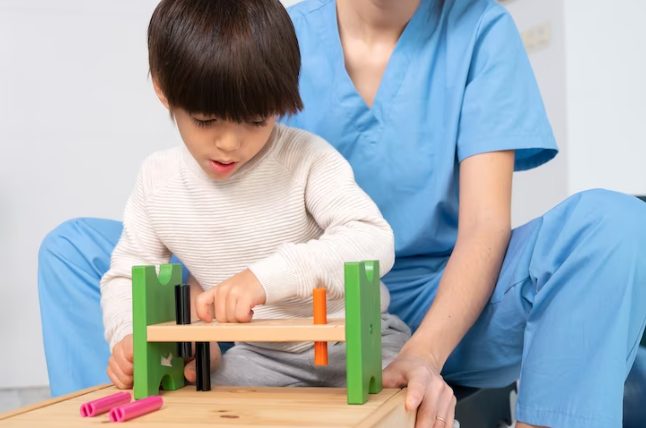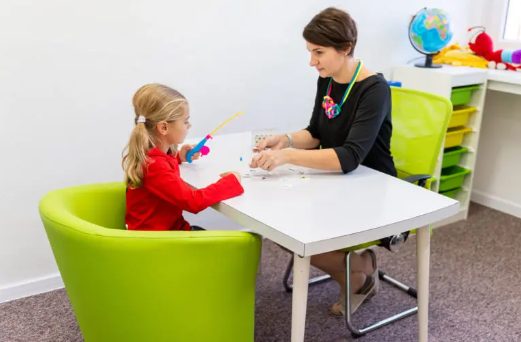
Neurodiverse children possess incredible talents and capabilities. However, they often face challenges in navigating the world around them due to sensory processing differences, motor coordination difficulties, or social interaction barriers.
That’s where occupational therapy comes into play; the remarkable intervention focuses on enhancing a child’s overall development as well as independence, especially in terms of participating in daily life skills and abilities.
Through this blog, we aim to shed light on the fundamental principles of occupational therapy (OT) for neurodiverse children. We will also delve into the intricacies of OT, how it is different from other approaches, and the challenges faced by neurodiverse children. In addition, we will also take a closer look at how parents can identify the need for occupational therapy services for their little ones.
So, let’s explore the profound impact that occupational therapy can have on the lives of neurodiverse children, empowering them to thrive and reach their full potential.
What Differentiates Occupational Therapy from Speech, ABA, and Physiotherapy?
Occupational therapy, speech therapy, applied behaviour analysis (ABA), and physiotherapy, each play unique roles in addressing different aspects of a neurodiverse child’s overall development. While physiotherapy is a form of rehabilitative care that focuses on improving mobility, movement, as well as function, applied behaviour analysis (ABA) therapy is aimed at enhancing social, learning, and communication skills through positive reinforcement. In comparison, occupational therapy (OT) is a form of care that focuses on helping children perform daily tasks more easily and efficiently.
What differentiates OT from other forms of therapeutic approaches is that it focuses on enhancing a neurodiverse child’s ability to engage in meaningful activities and daily routines, thereby promoting independence and overall well-being. Moreover, occupational therapy also emphasizes the development of skills related to self-care, fine motor coordination, sensory processing, and social participation.
Navigating the Day-to-Day Challenges of Neurodiverse Children:
Neurodiverse children often face a range of day-to-day challenges that can impact various aspects of their lives. These include –
- Meltdowns or tantrums
- Problems with self-regulating, transitioning, or engaging with peers
- Struggling to achieve age-appropriate milestones
- Sensitivity to clothing textures, food textures, messy activities, or loud noises
- Difficulty with self-feeding, dressing, using or holding toys
- Poor pencil grasp, drawing, writing, or cutting
Often, the accumulation of such challenges can contribute to increased anxiety and feelings of being overwhelmed, which in turn, impacts children’s ability to engage in daily life activities. In response to these difficulties, occupational therapists focus on working closely with children to identify their strengths, challenges, and goals, while personalizing interventions to suit their needs.
From engaging independently in self-care and productivity skills to managing tasks such as dressing, eating, cleaning, and organization, occupational therapy aims to maximize functional abilities in neurodiverse children and, ultimately, lead to successful involvement in a wide range of social environments.
Identifying the Need for OT Services: The Integral Role of Parents & Caregivers:
Does your child face difficulties with day-to-day activities at home, school, or in the community, as mentioned in the above section?
If you answered yes, there’s a high likelihood that your child could reap significant benefits from occupational therapy services!
However, if you’re still unsure whether your neurodiverse child needs occupational therapy, consider a few indicators – closely look for difficulties in daily activities, such as self-care tasks, fine motor skills, sensory sensitivities, or problems with social interactions, as these could be strong signs of needing OT assistance. Additionally, if your child experiences a delay in development, struggles with attention or emotional regulation, or has trouble adapting to new routines, occupational therapy may be highly beneficial, as well.
“What if I, as a parent or caregiver of a neurodiverse child, want to know more about when and how we could access occupational therapy and associated options?”
We’re here for you!
Consulting with or seeking an evaluation from an experienced occupational therapist at Early Autism Services (EAS) can provide valuable insights into your child’s specific needs and determine whether occupational therapy is the right approach for them. So, get in touch with our experts right away.
Top 4 Areas Where Occupational Therapy is Instrumental:
One of the most distinctive features of occupational therapy is that it involves no attempt or intention to ‘fix’ traits. Instead, the therapeutic approach aims to support neurodiverse children in understanding their unique requirements, resulting in them being able to engage fully in regular, day-to-day activities.
Accordingly, here are the top 4 areas where occupational therapy can prove to be extremely beneficial for neurodiverse children –
- Sensory Integration: Occupational therapists can help children with sensory processing differences to regulate and integrate sensory information. Through sensory-based interventions, OT can help children improve the processing and integration of sensory inputs in order to gain appropriate adaptive responses to everyday stimuli. As a result, the approach not only improves the child’s ability to engage in daily activities, but also enables them to navigate their environment effectively.
- Fine Motor Skills: With the goal of developing fine motor skills, including activities like handwriting, cutting, buttoning, and self-care tasks, occupational therapists focus on the use of personalized techniques and exercises to enhance hand-eye coordination, dexterity, and other abilities.
- Self-Care and Independence: Occupational therapists assist neurodiverse children in acquiring essential self-care skills such as dressing, grooming, feeding, and using the toilet. Moreover, they also work on promoting independence and building routines that empower children to perform these tasks efficiently and with confidence.
- Adaptive Strategies and Environmental Modifications: By working together with families and educators, occupational therapists help build adaptive strategies and modify environments to support the unique needs of neurodiverse children. In this regard, an occupational therapist specializes in assessing the child’s home and providing comprehensive feedback on modifications in order to minimize hazards, promote functional independence, and improve the quality of life.
Occupational Therapy at EAS: An Integrated & Holistic Service
In collaboration with highly skilled occupational therapists, Early Autism Services (EAS) is dedicated to providing result-oriented OT services, tailored specifically to neurodiverse children and their special needs. Besides, we believe in the significant potential of a holistic approach that takes into account your child’s individual strengths, challenges, and unique sensory profiles.
Rooted in years of experience and a deep understanding of the diverse needs of children on the autism spectrum, Early Autism Service’s pediatric occupational therapists closely evaluate a neurodiverse child’s current motor and neuromuscular performance, and create personalized therapy plans that help them lead more independent and fulfilling lives.
And if you’re ready to provide your child with the best occupational therapy services in Bangalore, fill out this form to reach out to us at the earliest!
Rest assured that our team of experts will go the extra mile to assist you with any queries you have, especially in terms of the unparalleled autism care services and therapies we offer.


